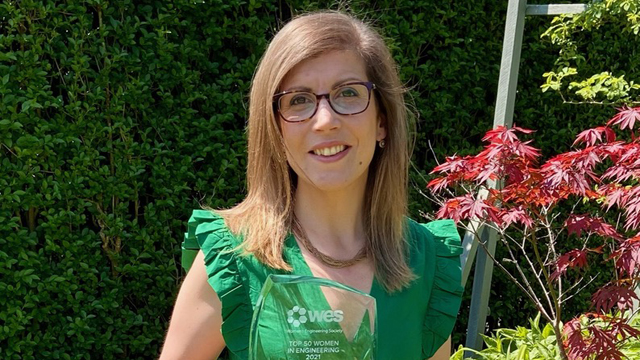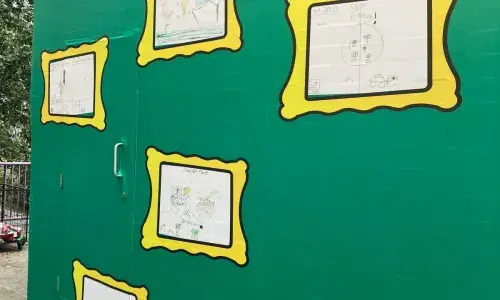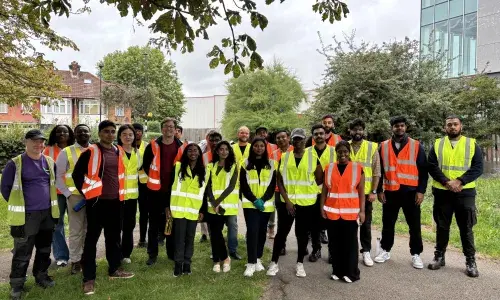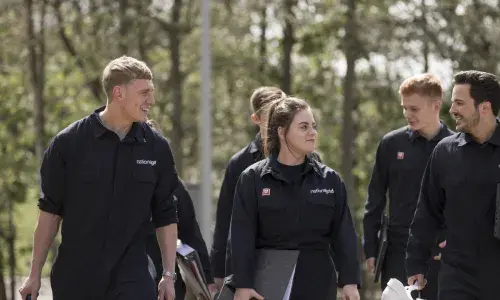
Meet our award-winning engineer who's always aimed high
Susana Neves e Brooks is part of the prestigious Women's Engineering Society's 2021 list of top 50 women in engineering, announced to mark International Women in Engineering Day (INWED). Read on for more about her, from her childhood love of fighter jets to her thoughts on now being an award winner.
Susana works in our Electricity Transmission business at the moment, but will be moving to the National Energy System Operator (NESO) as Customer Connections Senior Manager later this year.
Aiming high – a childhood ambition to fly F16s
I grew up in Portugal and my dream job as a child was to become a Portuguese Air Force pilot. In particular, I had a fascination with F16s. My attraction to that was down to a few things: the sense of freedom that I associated with being up in the skies like the birds; the fact that I would be protecting my country; and, lastly, because at the time I could possibly have been the first woman to join the chosen few pilots in the force.
Although I’ve long left behind aspirations to become a fighter pilot, I still hope to obtain a private pilot’s license and it’s part of my retirement plan.

An unusual path to engineering
Honestly, I got into engineering by accident and my journey to being an engineer was not as straight-forward as you might think. My first degree was in International Relations at the Portuguese University of Minho and I then moved to the UK in 2007 – planning to start an internship with an MP, but destiny just decided that wasn’t to be. The reality of no salary for six months and a requirement to be available 24/7 led me to delay the internship, so I could secure a more stable financial position for an unpaid role later on.
So I started working at EDF in January 2008 on what was to be a temporary job, only to end up hooked to what was then (to me) the strange new world of the electricity industry. I navigated from being a Customer Service Adviser to a Major Projects Project Manager by the time I left what was by then UK Power Networks, at the end of a very successful almost 11 years there.
Firmly committing to engineering
Although I initially ended up in the industry by accident, from the moment I decided to make the most of the opportunity at EDF, I became incredibly focused and driven to define possible careers paths, areas and strategies for personal development, up-skilling and learning. With every new achievement I set myself goals for further progression, continuously striving for professional success and also finding ways to have a positive and long-lasting impact in what I do.
… I set myself goals for further progression, continuously striving for professional success and also finding ways to have a positive and long-lasting impact in what I do.
Supported to build qualifications
I’ve been very lucky to be supported to complete qualifications, including an HNC in Electrical Engineering and APM Project Management Courses. As part of practical training, I’ve completed technical assessment programmes associated with the role of Electrical Engineering Designer.
I’d still like to apply for a Masters, bringing together my experiences, my previous studies and the challenges the energy industry faces – the one I’m currently most interested in is an MSc in Global Energy Management.
Moving on
I left UK Power Networks and joined National Grid in September 2018. I was incredibly lucky to be offered the opportunity to take on the role as Lead Project Manager on the major project that saw the construction of the new 400kV overhead line between Canterbury and Richborough, new 400kV substation build at Richborough and extension of the Canterbury Substation to accommodate the connection of the Nemo Interconnector.
In 2019 I joined the London Region team in electricity construction, providing leadership to my team of project engineers and support staff.
Another great experience was on the London Power Tunnels 2 team, during the period of transition between project development and delivery – the preparation for setting up delivery strategies and initiating the tender for the contract award for the tunnels package. Even in just 33 months, the amount of opportunities I’ve been allowed to be part off is incredible.
Proud to be recognised as a leading female engineer
At a professional level, winning the Women’s Engineering Society (WES) Award for the top 50 women in engineering has been one of the happiest and proudest moments, and one of the greatest achievements, of my life. When I received the email about it I got a bit emotional. However, I was in one of my first in-person meetings in the office and I had to keep my composure – easier said than done.
Looking back at all the women who’ve been recognised by WES, I feel privileged to join such an outstanding and inspiring group of professionals. I hope that my achievement can inspire others, the same way I have been inspired by women within National Grid.
Bringing diverse perspectives
Looking at National Grid and other organisations, we can clearly see an increase in the number of women in leadership roles. This is a really supportive organisation – it values the input women at different levels can bring.
Times are changing and some of the preconceptions about women as engineers are disappearing or being frowned upon.
I’ve been encouraged by line managers and senior management to focus on my development, look to the future, take part in programmes to further build my capabilities as a leader and understand how I can unlock possibilities for future progression.
Times are changing and some of the preconceptions about women as engineers are disappearing or being frowned upon. We’re slowly getting to a place where individuals are being measured on their ability and capability, instead of sex, race, ethnicity or background.
Advice for engineers of the future
My best advice for anyone interested in an engineering career is to look for internships, apprenticeships or opportunities for engagement and learning early on – even when you’re just starting college. Having real work experience will play a key role in helping you determine what areas to focus on and identifying your strengths.
I’d also say never be afraid to speak up or ask a question, whether that’s in a room with two people or 20 – it’s always better to be informed and to challenge, and that will make you stronger and enable others to respect you more.
…never be afraid to speak up or ask a question … it’s always better to be informed and to challenge, and that will make you stronger and enable others to respect you more.
Overall, the energy sector is facing some great challenges – you can be part of the group delivering a sustainable energy sector that meets the needs of its consumers and secures a greener future for generations to come.
Ambitions for her own future
Looking to the future, I want to be part of the solution to the challenges that lie ahead for National Grid and the energy industry, and of creating strategies that enable enduring improvement.
The world around us is evolving at such a great pace and the challenges to what we do and how we do it are bigger than ever – climate change, resilient generation, transmission and distribution of electricity, sustainable business, the development and use of new technologies, creating more interconnections between countries in a world that seems to be growing more distant within itself, diversity and inclusion, and continuous safety culture improvement, just to name a few. There’s a lot for us all to do.
Watch related video



